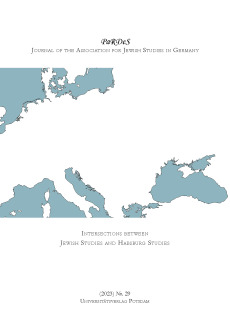Rafael Arnold / Ilya Berkovich / Tim Corbett / Moritz Csáky / Johannes Czakai / Lida-Maria Dodou / Monika Halbinger / Felicitas Heimann / Felicitas Heimann-Jelinek / Klaus Hödl / Magdalena Jánošiková / Verena Kasper / Verena Kasper-Marienberg / Anthony D. Kauders / Katrin Keßler / Alicja Maślak / Alicja Maślak-Maciejewska / Omar Nasr / Zora Piskačová / Michael K. Schulz / Elana Shapira / Sean Sidky / Martin Stechauner / Cheuck Him Ryan Sun / Mirjam Thulin / Hava Tirosh / Hava Tirosh-Samuelson / Michelle Tusan / Susanne Weigand
Intersections between Jewish Studies and Habsburg Studies
Herausgegeben von Oskar Czendze, Herausgegeben von Björn Siegel
Reihe: PaRDeS : Zeitschrift der Vereinigung für Jüdische Studien e.V.In the aftermath of the Shoah and the ostensible triumph of nationalism, it became common in historiography to relegate Jews to the position of the “eternal other” in a series of binaries: Christian/Jewish, Gentile/Jewish, European/Jewish, non-Jewish/Jewish, and so forth. For the longest time, these binaries remained characteristic of Jewish historiography, including in the Central European context. Assuming instead, as the more recent approaches in Habsburg studies do, that pluriculturalism was the basis of common experience in formerly Habsburg Central Europe, and accepting that no single “majority culture” existed, but rather hegemonies were imposed in certain contexts, then the often used binaries are misleading and conceal the complex and sometimes even paradoxical conditions that shaped Jewish life in the region before the Shoah.The very complexity of Habsburg Central Europe both in synchronic and diachronic perspective precludes any singular historical narrative of “Habsburg Jewry,” and it is not the intention of this volume to offer an overview of “Habsburg Jewish history.” The selected articles in this volume illustrate instead how important it is to reevaluate categories, deconstruct historical narratives, and reconceptualize implemented approaches in specific geographic, temporal, and cultural contexts in order to gain a better understanding of the complex and pluricultural history of the Habsburg Empire and the region as a whole.

